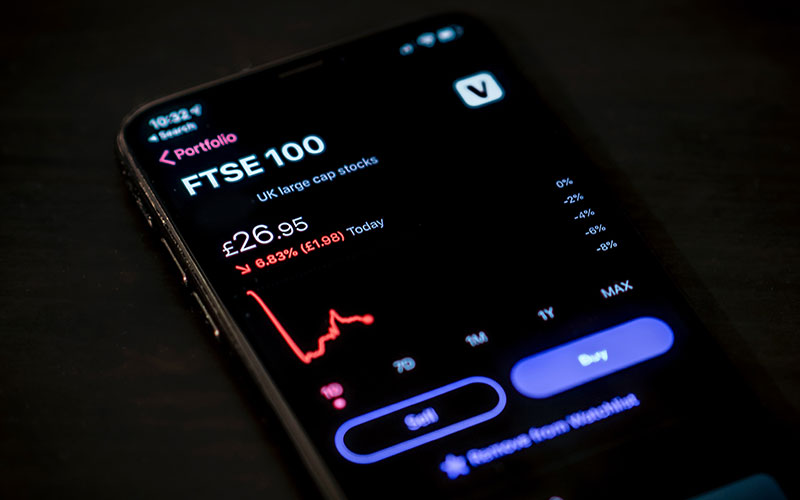Getting started in investing
At OneFamily, we believe everyone should have the same access to different ways to grow their money as everyone else.
When investing feels overly complicated, it can be off-putting for people who haven’t been taught about finance. That causes some members of society, especially young people, to be excluded from opportunities to make their money work harder.
What is investing?
"Investing" means buying types of investment, such as shares in companies, in the hope that the value of those investments increases so that you can sell them for more than you bought them for.
Of course, you're not guaranteed to make money and there is a risk that you might want to sell your investments at a time when they're worth less than you bought them for. If this happens, you'll get back less than you paid.
If you're looking to put some money aside, you could choose to either save or invest it. Broadly speaking saving means putting your money into an account that grows by building interest, whereas investing typically means paying your money into an "investment fund" along with other investors' money.
How does investing work?
A common way to invest is to put your money in an investment fund where a fund manager chooses what investments to buy with your, and other investors', money.
Investment funds come in all shapes and sizes. If you choose to invest by opening a Stocks and Shares ISA, you can usually choose which fund you want to invest your money in.
The investment fund you choose will be used to buy various different types of investments: things like shares in companies, property and corporate and government bonds. Your money increases or decreases as the value of those assets changes.
"Low-risk" or "cautious" funds invest more of your money in safer assets like government or corporate bonds, and less in more risky assets like company shares. On the flip side, a more risky fund might invest more of your money in company shares.
Typically the more risk you take, the more your money could potentially grow by - but the greater the chance of losing money.
So, is investing riskier than putting money in a savings account?
Both come with different risks.
With investing, there is a risk of ending up with less money than you've put in. This happens if you choose to withdraw your money at a time when the assets invested in are worth less than they were when you started investing.
For example, as there’s no limit to how much companies can grow, investing in company shares has a higher potential to make you money. But it comes at a risk – companies can shrink as well as grow so you could get back less than you put in, depending on what’s happening with your shares when you choose to sell your investments (ie withdraw your money).
With a savings account (an account that grows by building interest), there's a risk that your money will grow by less than the cost-of-living goes up by.
How much money you make in this type of account depends on interest rates. You can’t technically lose money, but if inflation (how much things cost) goes up by more than you make in interest you could be losing money in "real terms", which is when the price of the things you want to buy goes up faster than the amount of interest your savings make.
Generally speaking, risk smooths out over time as the ups and downs of the stock market are less significant over longer periods of time. In fact, in every 10-year period since 2000, stocks and shares have out-grown interest rates.* We don't recommend investing if you plan to withdraw your money within five years.
How can I invest my money?
At OneFamily, we offer two adult ISAs that invest in stocks and shares on your behalf. That means you don’t need to choose which companies to buy shares in, our fund managers do that for you. You simply need to choose between two funds – one slightly riskier than the other.
If you have a Child Trust Fund or Junior ISA with us, you’ll be able to easily transfer money into a Stocks and Shares ISA or Lifetime ISA (or a bit in both!) once you turn 18 by logging into your online account.
Or you can open either ISA with a £25 direct debit or a lump sum of £250.
We’ve produced a short video to explain how investing in stocks and shares could work for you.
OneFamily's investment options
We recommend only choosing a stock and shares (investment) ISA if you plan to keep your money invested for at least five years.
Lifetime ISA
If you're saving up to buy your first home, a Lifetime ISA could be a good fit for you. You can invest up to £4,000 each tax year and the government will top up everything you invest by an extra 25%. That's up to £1,000 of free money every year!
Just be aware that if you do withdraw money for anything other than your first home then HMRC will charge you a large penalty (unless you've turned 60 when you can do what you like with the money).
Find out more about our Lifetime ISA
Stocks and Shares ISA
If you want to save for anything other than your first home or you’re not yet sure what you’ll use the money for, our Stocks and Shares ISA could work for you.
You can use the money in your Stocks and Shares ISA however you like and withdraw money at any time with no penalties for taking it out.
This makes it a good option if you think you might need to dip into your savings in the next few years but still want to make your money work hard for you.
Important information
When investing it is important to be aware that the value of your investment can go down as well as up, meaning you could get back less than has been paid in.
Our investment products are best-suited to long term savings goals.

What's next?
If you haven't already, you can register now to take control of your Child Trust Fund or Junior ISA (as long as you've turned 16).
DO NOT DELETE
*Source: Barclays GILT study 2023

We have two adult products that invest in stocks and shares:
You may also be interested in:
Next steps for your Child Trust Fund or Junior ISA
Take a look at the options available to you once you turn 18 and take over your account.
Is it better to save or invest your money?
You can choose to save money in a savings account to grow with interest rates, or you can invest it in an investment fund, which buys shares in the stock market.
Holding your nerve when your investment loses value
Turbulent markets can affect the value of your stocks and shares ISA, but the worst thing you can do is panic.
How does the annual ISA allowance work?
Individual savings accounts (ISAs) allow UK residents to invest or save their money without paying tax on any money they make.
